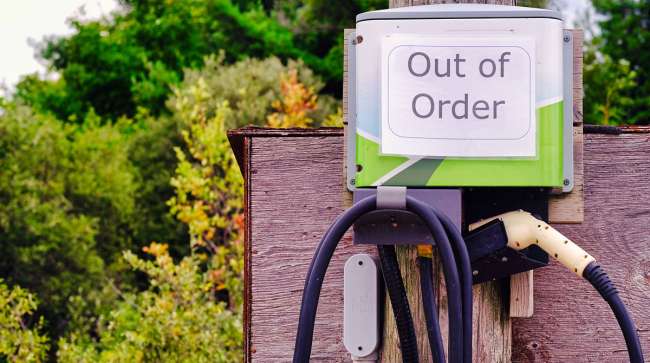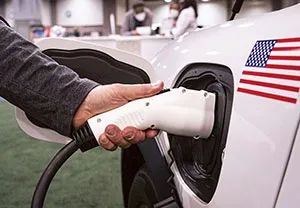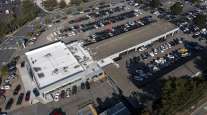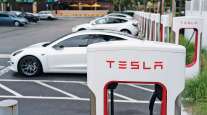Staff Reporter
FHWA Offers $100 Million in Grants to Fix Broken EV Chargers

[Stay on top of transportation news: Get TTNews in your inbox.]
Up to $100 million in government grants is available for states and local governments to repair and replace existing broken electric vehicle charging infrastructure, the Federal Highway Administration announced Sept 13.
“This funding represents the latest step toward building a convenient, affordable, reliable charging network that reaches every corner of our nation,” said U.S. Transportation Secretary Pete Buttigieg, adding that “America is leading the electric vehicle revolution,” thanks to the Biden administration.
The federal funding is meant to improve the reliability of existing EV charging infrastructure. By providing states and municipalities with cash, the FHWA is seeking to “provide a targeted and cost-effective mechanism to rapidly increase the number of available chargers” as states begin to implement infrastructure plans to create new EV transportation corridors.
An FHWA grant notice says eligible applicants “include only State DOTs and local government,” however, applicants are encouraged when possible to coordinate on repairing nonworking chargers.
Today, FHWA opened applications for up to $100M in funding to make our EV charging network more reliable. Watch FHWA Administrator @BhattmobileT on how this new program will improve EV network reliability & keep up with demand. #InvestingInAmerica https://t.co/GyOsvU3WyH pic.twitter.com/vxp4suloGb — Federal Highway Admn (@USDOTFHWA) September 13, 2023
Energy Secretary Jennifer Granholm said the federal government is “building up a national EV charging network with chargers made in the USA. Today’s investment is a pivotal step toward revitalizing our current charging infrastructure making EV driving cheaper, more reliable and more convenient.”
FHWA officials forecast that the $100 million in grants will be enough money to pay for EV charger repairs or replacements for all eligible projects. “This includes both publicly and privately owned chargers — so long as they are available to the public without restriction,” according to the notice. Any charging station that is not maintained or restricts access only to customers, tenants, employees or other consumers is not defined as publicly accessible.
“Eligible applicants may propose repair or replacement projects on public or private property, provided that the eligible applicant can demonstrate consent from the charging station operator and property owner,” FHWA says.

Energy Secretary Jennifer Granholm said the federal government is “building up a national EV charging network with chargers made in the USA. (Al Drago/Bloomberg News)
The agency found that in early September there were 6,261 nonworking public EV charging ports (4.13%) from a total of 151,506 nationwide identified as “temporarily unavailable” by charging providers. The total number of those temporarily unavailable regularly fluctuates.
States with the most nonfunctional EV chargers were California (1,539 alternating current Level 2 and 168 direct current fast chargers), New York (517 Level 2/24 DC chargers), Texas (350 Level 2/29 DC chargers), Florida (342 Level 2/14 DC chargers) and Washington (232 Level 2/26 DC chargers).
Broken or nonoperational EV chargers eligible to be fixed with federal funds are those chargers and “intrinsically related equipment” that no longer works as designed by manufacturers due to such causes as accidents, vandalism, natural disasters and equipment degradation.
A final FHWA list of “temporarily unavailable” EV charging ports will be published Oct. 11. Grant eligibility will be limited to chargers on that list.
Grant oversight, technical assistance and guidance will be provided to recipients by state FHWA division offices and the Joint Office of Energy and Transportation.
The grants require cost-sharing. Federal dollars will pay up to 80% of total project costs, but the remaining 20% must include cash or in-kind services. FHWA estimated the average replacement cost for a Level 2 is $5,000, and between $50,000 and $125,000 for a DC charger.
Grant applications are due by Nov. 13, with awards to be determined in a streamlined application process.
Want more news? Listen to today's daily briefing above or go here for more info
“Charging your electric vehicle should be as easy and convenient as filling up a gas tank — and this investment will make our EV charging network more reliable, full stop,” said Federal Highway Administrator Shailen Bhatt. “We’re building a bigger EV charging network to keep up with driver demand, and we’re also going to make sure the currently available network is working when you need a charge.”
Applicants are encouraged to submit grant requests with their contractors or sub-grant recipients identified and work directly with site hosts and current owners/operators to ensure project viability.
Funded chargers should be operational within 12 months of receiving the grants.




